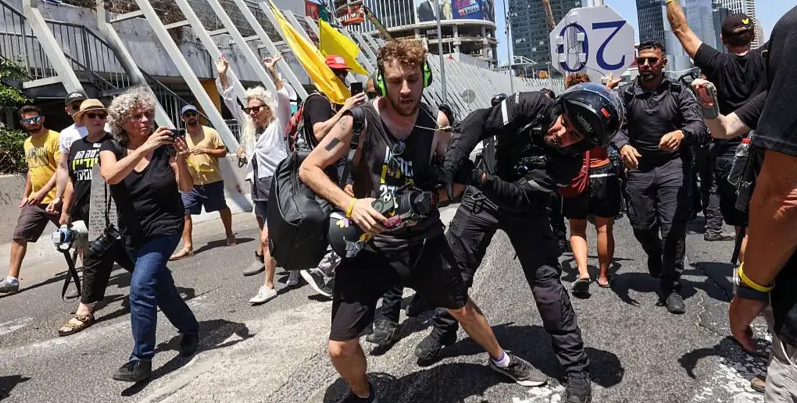Alwaght- The Israelis ended their weekend with massive protests. Anti-war demonstrations of hundreds of thousands of Israelis in the main square of Tel Aviv culminated in last hours of Monday, showing deep gaps between the people and the hardline and largely unpopular government led by Prime Minister Benjamin Netanyahu.
The protest, which began on Sunday and continued into the early hours of Monday, was billed as a day of “Israeli solidarity with the families of prisoners” and called for an end to the war and the return of prisoners. Many businesses went on strike, and groups of protesters blocked major highways in Tel Aviv.
The large turnout in the Tel Aviv demonstration showed that pressure is mounting on Netanyahu, a prime minister who has been largely indifferent to public sentiment and opposition to the genocide in Gaza two years after a massive offensive that killed tens of thousands.
Conflict of views of government and public
The huge protests in Tel Aviv and other cities in the occupied territories showed that the public opinion are at loggerheads with the government especially on the goals of Gaza war.
The Israeli military has stated that its goal in the Gaza war is to eliminate Hamas as a military and ruling force in Gaza, but a large part of Israeli public opinion wants to release the remaining Israeli prisoners in Gaza, held by Hamas since October 7, 2023. Prisoners, of whom the Israeli military estimates that only about 20 are still alive.
Experts also believe that the two goals of completely defeating Hamas and freeing Israeli prisoners are contradictory and unattainable, because the only practical way to free the prisoners is to negotiate with the resistance movement in Gaza for their release, and any negotiation with Hamas would mean admitting defeat by the hardline Israeli cabinet.
The main demand of Israeli protesters in the demonstrations on Sunday and Monday morning was that the return of the prisoners home be given priority. This is while the Israeli government and army, in the face of international and domestic criticism, are still advancing their plan to capture Gaza City and possibly the rest of the besieged Palestinian region.
Yohanan Plenser, the president for Israeli Democracy Institute which is a non-partisan research center based in Al-Quds (Jerusalem), told the New York Times that the push for achieving two goals simultaneously is no longer possible. He added: "Defeating Hamas may take months and even years, but returning the prisoners in a specific time frame is possible."
Plenser adds that the less popular Netanyahu feels and the less support he receives in the polls, the more he becomes dependent on the support of his far-right ruling coalition partners to stay in power. So for now, the protests are of less importance to Netanyahu, as he sees himself as dependent on the far-right wing, which supports the continuation of the war in Gaza and even its full occupation.
What do polls say?
Polls have for times shown that a large majority in Israel favor ceasefire deal to free the prisoners in return for end of war. The last round of talks with Hamas on a ceasefire failed later in July. Wiki Cohen, an Israeli whose son is a prisoners in Gaza, told CNN: "We are united in a simple demand from the Israeli cabinet: to end the war in exchange for the return of the last prisoners. It is time to end the terrible nightmare that the entire country has been living in for 22 months."
Also, according to the results of a new poll conducted by Israel's Channel 13, 63.7 percent of Israelis support ending the war and returning all Israeli prisoners. The poll also showed that only 25.1 percent of Israelis agree with continuing the war in Gaza.
The Arab 48 website reported that "60 percent of voters in the Israeli parties have called for the resumption of negotiations for the release of prisoners in Gaza."
On the other hand, the Israeli Channel 12, reviewing the results of a poll, announced that 62 percent of Israelis want to reach a comprehensive agreement with the Hamas movement, based on which all prisoners from Gaza are released.
According to the poll, 49 percent of Israelis are against the construction of settlements in the Gaza Strip, and 36 percent are in favor of this.
The poll also shows that 55 percent of Israelis are not satisfied with the performance of Israeli Prime Minister Benjamin Netanyahu.
On the other hand, the results of the latest survey in the occupied territories indicate that, following the increasingly exposed extent of the genocide and famine in the Gaza Strip and the world's reaction to it, 56 percent of Israeli settlers are afraid of traveling outside the occupied territories.
Results of Channel 12 showed that 56 percent of the Israelis are afraid of traveling abroad due to international criticism against the Israeli regime.
Yedioth Ahronoth on Wednesday reported that Israeli tourists are exposed to humanitarian behavior and even violence in restaurants, streets, and hotels around the world.
International affairs expert Enrique Zimmerman had previously expressed concern over the current situation, saying: "The things we are hearing about Israel around the world now are very difficult, and the consequences will be evident in the coming years. Israel is more isolated than ever."
Suppression wave
The recent protests in Tel Aviv were met with crackdown. According to a report by Euronews, Israel police used water cannons to attack the demonstrating masses. The police also arrested 38 of protesters. Reports, meanwhile, suggest that some business have gone on strike in support of the protests.
Some demonstrators announced that they go to borders of Gaza that is a war zone and arrange their protests there.



























